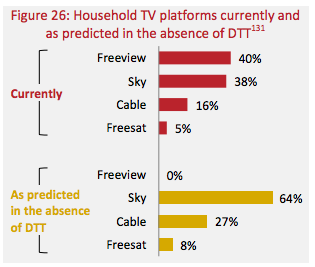Should the UK close down the TV networks to allow for more mobile broadband?

From the Digital UK Press Office today:
A new report published today reveals the major economic benefits that Freeview and other terrestrial TV services deliver to the UK.
The report shows that the country's most widely used platform returns nearly £80bn to the economy and challenges the view that mobile broadband delivers more value from airwaves than television.
The findings come at the start of a year when crucial decisions about the future of free-to-air TV will be made by policy makers in the UK and EU. Just over a year after digital switchover freed up capacity for 4G mobile broadband, a further shake-up of the airwaves is being considered to release more spectrum for the mobile market.
Commissioned by Digital UK, the report by media and telecoms consultancy Communications Chambers sets out for the first time the economic and social importance of digital terrestrial television (DTT) which delivers broadcast channels for both Freeview and YouView - and is watched in three-quarters of UK homes.
Headlines from the report include:
- Evidence of DTT's vital role in supporting UK broadcasting, driving innovation and investment in programme-making while keeping consumer costs down
- DTT provides nearly £80bn* to the UK - significantly more than previously estimated - and supports 15,000 jobs in broadcasting and independent production
- New economic analysis showing that DTT delivers more value per unit of spectrum than mobile broadband (see notes)
As the largest free-to-air TV service, DTT creates healthy competition between platforms and ensures viewers can access public service channels without subscription Digital UK and its members (BBC, ITV, Channel 4 and Arqiva) are urging government to ensure any further transfers of airwaves do not weaken Freeview and other terrestrial TV services, and that viewers should not suffer disruption or foot the bill for making the changes. In a joint letter accompanying the report, Tony Hall, BBC Director General, Adam Crozier, CEO of ITV, David Abraham, Channel 4 CEO and John Cresswell, CEO of Arqiva, stress the importance of terrestrial services such as Freeview in ensuring the UK remains a world leader in television.
Jonathan Thompson, Chief Executive of Digital UK, said: "This report sheds new light on the value of DTT for viewers, the UK television sector and wider economy. With increasing demand for spectrum it is critical that DTT remains a strong proposition with the same coverage and range of channels viewers enjoy today."
Copies of the report can be downloaded from The Value of Digital Terrestrial Television in an era of increasing demand for spectrum [PDF].
Notes
*£79.8bn, calculated on the basis of ten year "net present value" (NPV)
New economic analysis: The report estimates that the average value per MHz of spectrum for DTT is 50% higher than that for mobile data and that the marginal value (the unit value that might realistically be reallocated between DTT and mobile) may be even greater. The report estimates the marginal value of mobile data per MHz of spectrum to be £0.19bn compared to £0.47bn for DTT.
MikeP "vision carrier at 799.25 to 847.25 MHz [sound at +6 MHz]) "
You seem to be having an analogue moment!
How digital television works | News headlines | ukfree.tv - 11 years of independent, free digital TV advice
| link to this comment |
9:47 PM
Good postings above. But confused just a little I am. What are the 4G plans precisely, and when will we have pan-UK 4G-coverage and at what cost to the consumer? Where is the black-hole into which we will "recycle" our rare-metal laden screens and boxes so that we may enrich even further the CEOs of 4G companies?
Will loan-friendly sharks altruistically allow all to acquire the newest and temporarily latest gizmos? Openreach vans whizz about, but laden with copper, not fibre-optic. Despite the promulgations of the infamously inspired Councillor, we face growing uncertainty regarding climate and solar fancies. If we ALL get fibre-optic to the door : wonderful ! If we put too many eggs in the satellite basket we may yet have to recycle the screen to a chopping board, as in the yootoob clip. Okay, toung outta cheek, but....
| link to this comment |
michael: the capacity of 4G is limited to 6MHz (up+down) per operator... It's not that much if 60 million people want to use it at once.

This is from Ofcom: The future role of spectrum sharing for mobile and wireless data services Licensed sharing, Wi-Fi, and dynamic spectrum access http://stakeholders.ofcom….pdf

| link to this comment |
Technical Evolution of the DTT Platform
An independent report by ZetaCast, commissioned by Ofcom
http://stakeholders.ofcom….pdf
"Spectrum Issues
15. The total amount of spectrum available for DTT may change over time ... Spectrum re-planning at a later date may result in DTT spectrum being re-assigned to other services, such as mobile broadban "
7.3 Future Spectrum re-Planning
The Asia-Pacific Telecommunity (APT), which includes Australia, China, Japan, South Korea and other countries in the Asia Pacific Region, agreed on a plan to assign the 698-806 MHz frequency range to mobile broadband in September 2010. There appears to be increasing interest in using this plan as the basis of an internationally harmonised approach for mobile broadband, to enable better economies of scale and facilitate global roaming.
If this band were also to be assigned to mobile broadband in Europe, it would necessarily involve a reduction in the spectrum available to DTT. Given the lengthy timescales normally required for international frequency coordination, it is assumed that this would take place after 2020, most probably around 2025. The scenarios examined in Section 8 therefore include the possibility that the number of DTT multiplexes would be decreased by 3 from 2025.
Table 7: Overview of the Scenarios Considered : No Roll-out of 3rd Gen services, 1st Gen services switched off in 2030
8.3.10 Scenario D1
In Scenario D1, there is no launch of 3rd Generation services during the period under consideration and 1st Generation services are switched off in 2030. It is also assumed that the DTT capacity is reduced to 3 multiplexes in 2025. A possible evolution of the number of programme channels of each generation of technology is summarised in Table 17 below.
Pros:
The advantage of this scenario is that more spectrum would be available for other uses from 2025.
etc etc etc
| link to this comment |
And, from
Robert Kenny, Robin Foster & Tim Suter
The value of Digital Terrestrial Television in an era of increasing demand for spectrum
January 2014
http://www.digitaluk.co.u….pdf
page 66

| link to this comment |
6:16 PM
Doncaster
of course everyone in the uk is going to instantly want to change to 4g??? Not. 60 million I do not think so. Quite a few people actually only use their phones to talk to people and text. Not everyones life circles round down loading on their phones.
But if you are in cahoots with the big companies of course they want you to use the internet even more. They can spy on you more as well. But stick to freeview they will not make so much money out of you either. Brians diagram shows you precisely why companies like sky want to turn freeview off
| link to this comment |
john's: mapJ's Freeview map terrainJ's terrain plot wavesJ's frequency data J's Freeview Detailed Coverage
TV over the internet, so you have to pay TV licence and phone line rental and internet costs you might as well have SKY.
| link to this comment |
Ian's: mapI's Freeview map terrainI's terrain plot wavesI's frequency data I's Freeview Detailed Coverage
john Martin: One should be wary of the assumption that your own personal feeling don't match what happens in the wider world.
One reason for the 4G requirements is to take pressure of 2G/3G for voice call use. 2G/3G technology is synchronous, and very suitable for voice calls.
4G (like the internet) is asynchronous. 4G phones still use GSM for voice.
4G isn't just phones, as I'm sure you're aware. 4G is tablets, USB-dongles, laptops, routers and any number of devices in the "internet of things".
According to Internet Access - Households and Individuals, 2013 - ONS
"In 2013, 21 million households (83%) had Internet access in 2013 ... 36 million adults (73%) in Great Britain accessed the Internet every day, 20 million more than in 2006, when directly comparable records began. "
So, your "Not everyone" is logically true - 17% of people don't use the internet - but all the evidence shows that is on a downward trend.
"But if you are in cahoots with the big companies of course they want you to use the internet even more. "
I don't know who that's aimed at. Not me, I hope.
Of course Sky want to get rid of Freeview (and Freesat and Netflix) it's "in their nature" as per The Scorpion and the Frog - Wikipedia, the free encyclopedia .
| link to this comment |
Ian: the house of lords proposals were that everyone would get a level of free internet access to compensate for the loss of Freeview.
| link to this comment |
7:13 PM
Ian: Perhaps, judging by the diagram, thats what Sky want everyone to think as well!
Frankly, this all seems to be manoeuvring by various lobbies over very valuable spectrum real-estate. The mobile companies want more, and have put down a flag, and have pushed Ofcom to open the whole subject up.
The terrestial companies have pushed back with their own report, telling the government just how valuable they are, and saying to their rivals that they should get their tanks off the terrestial broadcasters lawn.
The broadband industry is actually saying fairly little, since they must know such a scheme is years off, owing to lack of capacity, etc. And Sky looks on quite happily, since if there was a move to dish/net/cable, they would be in a perfect place to capture a large slice of the market.
The thing which does not make sense is why Digital UK assumes that Sky would automatically capture such a large part of the market. Freesat basically replicates what most of us already have, is free and the actually dishes are interchangable - wouldn't Freesat be the growth area?
| link to this comment |
